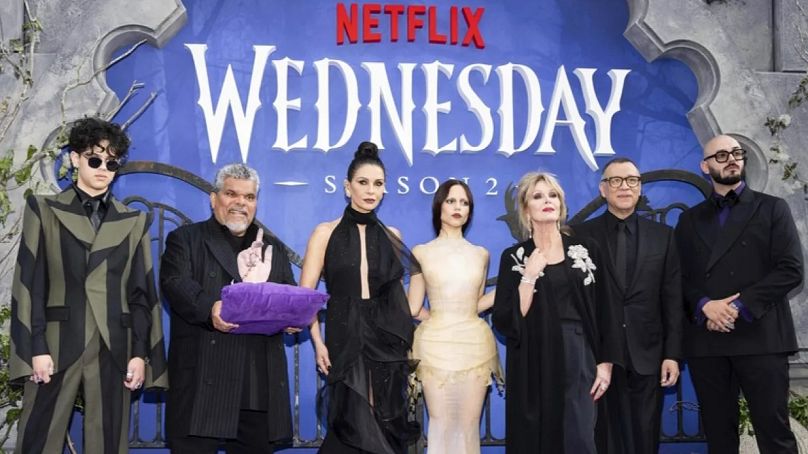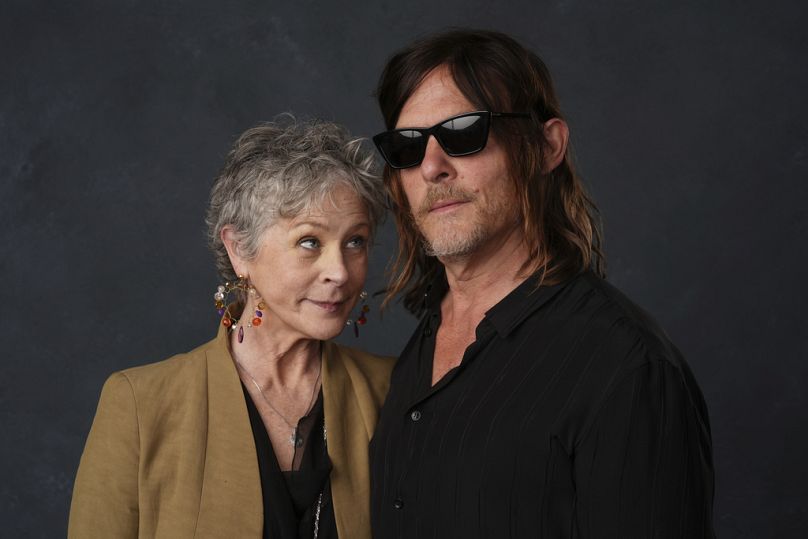Paco Cabezas, director of hit series 'Wednesday' and 'The Walking Dead: Daryl Dixon' among others, combines genres with a unique style that has taken him from Seville to Hollywood. Despite his success the States, he's continuing to make his mark in Spain on projects such as 'La novia gitana'.
Paco Cabezas has come a long way from his beginnings in Seville and being a boy who once dreamed of making films to becoming one of Spain's most prolific directors.
 ADVERTISEMENT
ADVERTISEMENT
 ADVERTISEMENT
ADVERTISEMENT
He's found fame and fortune too in Hollywood and earned a reputation for having a unique audiovisual style that gracefully mixes genres. Cabezas is widely credited for adding his signature touch to every production in which he participates.
If you're a regular TV addict, there's a very good chance you've seen his work. He's the filmmaker behind successful series such as 'Penny Dreadful', 'The Umbrella Academy', 'The Walking Dead: Daryl Dixon'** and one of the most watched shows on Netflix: 'Wednesday' (known as 'Miércoles' in Spain and 'Merlina' in Latin America).
Although he frequently rubs shoulders with the likes of Tim Burton, Nicolas Cage, Anna Kendrick and Sam Rockwell,** among many others, Cabezas hasn't lost the humility of the person who started out by writing in his spare time between work shifts.
He took time to welcome us during a break in the middle of editing his next series in central Madrid and sat down for a matcha tea and a chat.
Alongside his ongoing work in Hollywood, Cabezas continues to direct projects in Spain and enjoys both worlds. He has never wants to lose the link with his homeland, he tells us.
There's very little difference he says between the American and Spanish industries today he insists, claiming both countries now make very high-level TV and film productions.
The Spanish director stresses that working on American productions is like going to Disneyland: "Everything is built, the set, everything, you get there and suddenly you find yourself walking from one set to another as you change worlds".
While Spanish productions have reached a level that was unthinkable decades ago, working in the United States is still a completely different movie. Cabezas describes it perfectly: "In Spain, I'm like the father of the child and I have to raise it and dress it and worry about every detail. When I go to the United States, it's like the 'tito', who takes the nephews and nieces to Disneyland, to that wonderful world built where we go to have fun".
"Before, going to America was like a wonderful place. Now the differences are technical, let's say, about how you work. For example, in 'Wednesday' you have a lot of means, in 'La novia gitana', in 'La nena', I have less means, but more freedom. He explains that the complexity lies in finding the balance between creative freedom and the means you have.
In 'Wednesday', Cabezas has had the good fortune to work hand in hand with Tim Burton.** Despite what one might think, Burton has given him freedom to work on one of the American filmmaker's most personal projects, in which the world of the Addams family is transferred to an academy for teenagers with powers. A world where comedy and terror go hand in hand.
The Spanish creator highlights the generosity of Burton, who has a very marked cinematographic style that is more than familiar to all lovers of the Seventh Art, when it comes to creating the atmosphere of the Nevermore Academy and the people that both have used to tell the mysteries surrounding 'Wednesday', played by Jenna Ortega.
Cabezas has also recently released 'The Walking Dead: Daryl Dixon', whose season focuses on a zombie apocalypse in Spain. Many critics in Spain have given up on this new series of television's most famous zombies. But Cabezas says his compatriots can sometimes "take ourselves too seriously, we don't talk about the past, about the Civil War, so it's very refreshing that two Americans come along and take the Civil War, Franco and a thousand references to Spain and mix them into an explosive cocktail with zombies".
Cinema and TV series are a mirror of the reality we live in, Paco points out that science fiction or horror have always been political metaphors for what is happening to us right now, such as the complex geopolitical situation in various hot spots on the planet. That's why he tells us that "there's nothing more liberating than putting zombies in the mix and trying to reflect, but also somehow using a catalyst to try to make it healing, that somehow fiction is healing for us".
Zombies or monsters, Paco Cabezas tells us, bring us closer to death without having to pay a price: "As spectators, we want to go through that experience, to feel what would happen if I were devoured alive or to feel what it means to have that threat, but without having to, obviously, live it for real". And that is precisely the success of the genre: to feel adrenaline, fear, terror, but without actually living it.
An ambassador of Latin culture and Spain in Hollywood
A few years ago, roles for Latino actors were very limited. The only roles offered to them were drug dealers and thugs, a cliché that has taken years to be eliminated and that, even today, we still see in some fictions.
Fortunately, this custom is changing thanks to filmmakers such as Guillermo del Toro, the Muschietti brothers or Cabezas himself, who has imposed his stamp on the Latin part of 'The Addams Family', giving the patriarch a Hispanic context. Cabezas has taken special care in those words exchanged in Spanish between Gómez and 'Wednesday', as well as in the music and the Latin culture shown on screen.
Because representation is important and seeing one's own culture in a globally successful series also helps one to feel a sense of belonging and pride.
The key to success? Being true to oneself
Cabezas has achieved his goal: working on major international productions while continuing to direct in Spain, but it hasn't been an easy road. If he could give one piece of advice to someone aspiring to work in the turbulent world of film, he would tell them something that "is simple but complicated: be true to yourself".
He provides the perfect example, his first film, 'Carne de neón', was not a great success.
"Mario Casas was not perceived as a serious actor. However, for having made a risky, different, violent, strange, dark film, at the Tribeca Film Festival I found an agent. The director of 'Penny Dreadful' had seen the film and wanted me to take part in the next season".
"The hard thing is to find that story, your style in a place where we are overcrowded. There's too much information, there's too much going on, but I think the key is to be true to what you have inside and have the ability to tell and have the ability to stop at nothing to tell that story."












